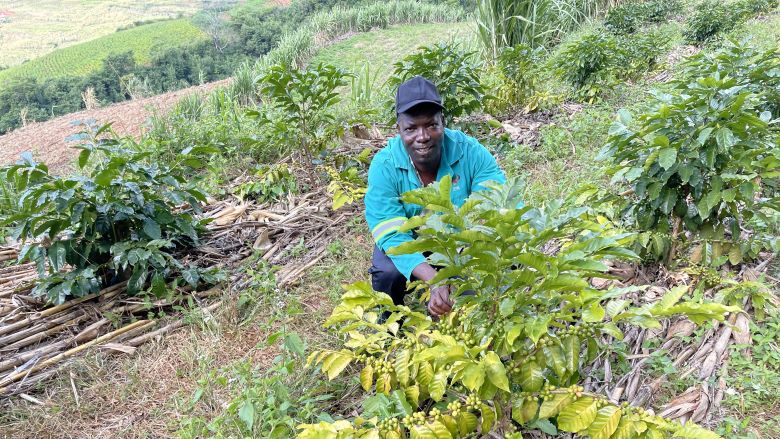 Francisco Mandlate in the AgroTur coffee seedlings nursery. Photo: Gabriella Morandi/World Bank
Francisco Mandlate in the AgroTur coffee seedlings nursery. Photo: Gabriella Morandi/World Bank
In agriculture, patience is a virtue. But people also need to eat. Coffee plants take several years to bear fruit and become productive. This is why local coffee companies are combining coffee plantations with food crops in the Chimanimani Mountains in central Mozambique, to allow communities to secure food as the coffee plants grow .
Fernando Chaúque, a local farmer, shared this sentiment with me. He said that by cultivating organic coffee in the shade within an agroforestry system, he actively contributes to reducing deforestation, nurturing the soil, and preserving our precious environment. Like other local beneficiaries, Fernando has received training and support to implement a mixed agricultural system, encompassing drought-tolerant crops, fruit trees, and agroforestry techniques. This ensures diversified yields, long-lasting prosperity, and the appreciation of the land.
Deforestation and forest and land degradation are threatening ecosystems and rural livelihoods. This is aggravated by climate change and the growing frequency of destructive floods. Nevertheless, for local communities, there is still hope in bringing back trees to protect the environment, minimize the impacts of climate change, and improve their livelihoods.
Along the borders of the Chimanimani National Park in the western province of Manica, organic coffee planting is becoming an essential livelihood for communities as an alternative cash crop, designed to reduce pressure on natural resources and create new sources of income .
With World Bank support, two Mozambican companies—Café de Manica and AgroTur—process and sell coffee, integrating local communities into economically sustainable coffee production systems. They have introduced shade-grown coffee in the buffer zone of Chimanimani, in degraded areas, and carved fields between lines of crops.
At the forefront of this initiative stands the production of Arabica Organic coffee, a gourmet product highly esteemed in the international market. This enterprise not only caters to the discerning tastes of coffee connoisseurs worldwide, but it also plays a crucial role in ecological restoration. The initiative breathes new life into the local community by harmonizing coffee cultivation with revitalizing deforested areas through intercropping native trees alongside coffee plants.
This resilient approach to farming has significant potential to mitigate the effects of climate change while also improving the livelihoods of local communities. By implementing sustainable land-use practices, farmers can reduce greenhouse gas emissions and improve the health and resilience of their ecosystems. Initiatives like this are a win-win approach, as they support ecosystem restoration and provide consumers with sustainable and organic products.
Both the coffee companies are forging a path towards the harmonious coexistence of nature and agriculture. Their commitment to this delicate balance extends beyond coffee sales, with Café de Manica dedicating 2% of its revenues and AgroTur contributing 5% to preserving this pristine, natural haven in a remote, mountainous region. It demonstrates their unwavering support for the Chimanimani National Park. It also establishes a vital mechanism for its long-term financial sustainability.
On my last visit to Chimanimani, I saw how agroforestry offers a promising solution for these rural communities. This initiative has already benefitted about 524 households, working on producing and selling coffee and other food crops in an area of approximately 350 hectares. Beneficiaries have access to seedlings, resources, and technical assistance, allowing them to introduce an alternative, high-yielding crop and keep their farming areas. This helps reduce deforestation in the region and supports restoration.
As we move towards a more sustainable future, we must continue promoting climate-smart agriculture in conservation areas to protect natural resources, improve food security, and support economic development in rural communities.
We hope the Chimanimani National Park is becoming a prime example of how conservation and sustainable agriculture can work together to promote environmental stewardship and rural development in Mozambique. And so, the forest is becoming verdant again, one coffee tree at a time.
RELATED:




Join the Conversation